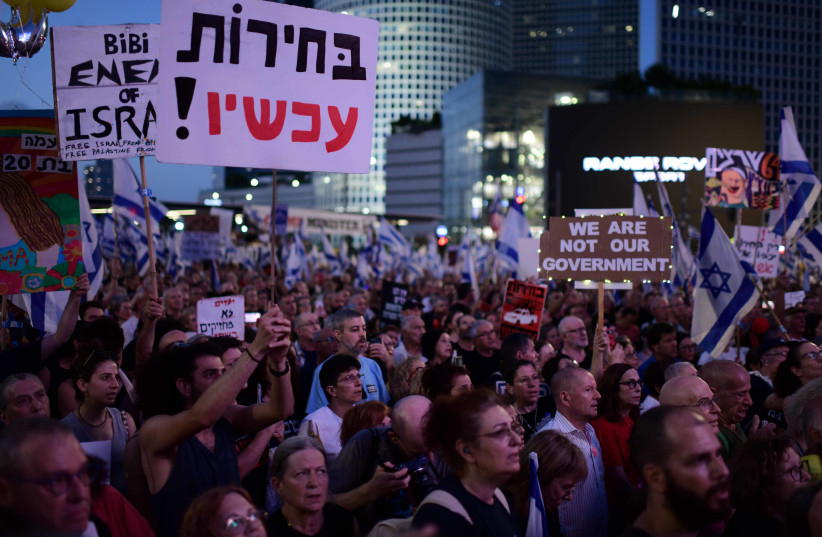In his first interview in Hebrew media since the outbreak of war, Prime Minister Benjamin Netanyahu insinuated that threats by protesters against his government’s judicial reforms to stop serving in the IDF reserves played a part in Hamas’s decision to attack Israel on October 7.
“The refusal [to serve] is a disaster – and created illusions for our enemies,” the prime minister said during the interview on Channel 14.
Netanyahu also criticized current protesters calling for an election.
“I say to the protesters – get it together. This is the time for unity, this is the time for greatness. Their goal is to bring down the government, and every time their excuse is different. I do not think that it reflects a majority of the people.
I turn to the majority of the people and say – this is the time for unity,” the prime minister said.

Netanyahu criticizes Gantz and Eisenkot
The prime minister also voiced harsh criticism of Benny Gantz and fellow National Unity MK Gadi Eisenkot for leaving the government on June 9, after joining it days after the October 7 massacre. Gantz and Eisenkot said that they had decided to depart after the prime minister began taking into account personal political considerations while making decisions regarding the war.
“Gantz and Eisenkot did something that is not done – leaving the government in war time,” Netanyahu said. Asked about their claims, the prime minister responded, “And they do not have political considerations? My consideration is to ensure the safety of Israel.” Netanyahu invited other parties currently in the opposition to join the government in Gantz and Eisenkot’s place.
In an odd moment in the interview, Netanyahu repeated a misleading claim that the bill to draft haredim into the IDF that is currently being processed in the Knesset Foreign Affairs and Defense Committee (FADC) will bring “many thousands” of haredi men into the IDF.
The bill, as it currently stands, includes a gradual increase of haredi draftees per year, from the current 1,000 or so per year to approximately 35% of each graduating class – roughly 5,000 men – per year in 2036. The numbers would not rise significantly in the coming years, and the sanctions for haredi yeshivot that do not meet their quotas are directed against the yeshivot themselves but not at the individuals who avoid the draft. This is widely regarded as insufficient to lead to real change.
Netanyahu said that he expected opposition leaders MK Yair Lapid and Gantz to support the bill, as it passed its first reading under their government in 2022. However, a significant portion of Knesset members from Netanyahu’s own Likud party, the entire opposition, and the Defense Ministry have all said that the law was no longer relevant to the IDF’s needs post October 7.
Netanyahu’s remarks on the haredi bill were surprising, as many members of the Likud, including those who have not expressed opposition to the bill as it currently stands, have said that it was only a preliminary version. This led to widespread belief that Netanyahu himself was open to a more sweeping version of the bill, closer to what many see as the bare minimum to meet the IDF’s needs – to reach a 50% draft rate of haredi men within five years.
The haredi parties are unlikely to accept such a version of the bill, and may opt to attempt to topple the government rather than pass it. The issue of the haredi draft is thus viewed as a litmus test for the prime minister – whether he acts in the national interest or gives preference to the survival of his coalition.
